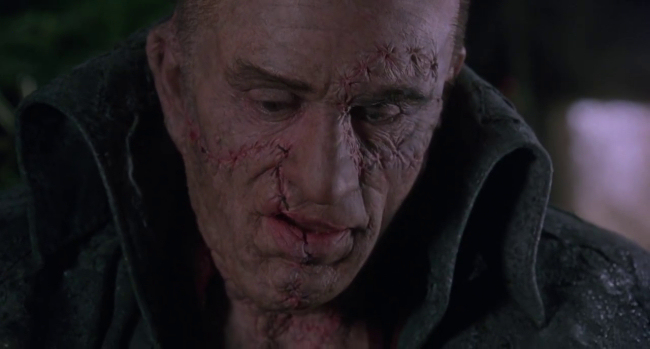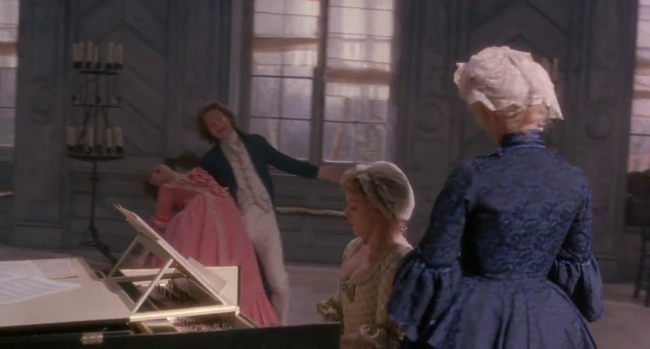
How can an adaptation that so earnestly endeavours to get things right get things so terribly wrong? In this, Kenneth Branagh is not unlike the protagonist of his 1994 version of Frankenstein, which he called Mary Shelley's Frankenstein but I really can't. This is not Mary Shelley's book but there are plenty of good movies based on Frankenstein that bear little resemblance to the novel. The film is the unnaturally assembled parts of Frankenstein the novel formed to articulate the vain and imperfect vision of one man.

One certainly couldn't fault the cast which includes Helena Bonham Carter, Ian Holm, and Robert DeNiro as the monster. Even Branagh playing Victor Frankenstein isn't necessarily bad. Though Branagh the actor suffers from the indulgence of Branagh the director who lingers on Victor's physique and takes pains to represent a social life for the young man with the continually sweeping camera movements and pretty people rushing about in the exuberance characteristic of late 1980s/early 1990s romantic period films. Not to mention the mullets, egad, the mullets . . .

The film works hard to give much more of Victor's life as it's portrayed in the book and goes into Victor's initial surprise at finding the occult authors who inspired him as a young man are scoffed at at school. But instead of the contrast being between the more daring aims of Agrippa and Magnus contrasted with the less exciting aims of Enlightenment science, Victor is shown embarrassed in an operating theatre by a professor who claims real science yields real results.

As in the book, Victor finds a slightly warmer reception by a Professor named Waldman, played by John Cleese, consequently making him impossible to take seriously. Sadly, Branagh misses the golden opportunity of having Cleese attempt to reanimate a dead parrot.

But the main problems with the film have to do the attempt to fix problems that Branagh and his screenwriters saw in the book that don't exist. Rather, they are the result of their failure to understand Shelley's intentions. Despite several of the authors and books Shelley mentions in Frankenstein appearing in Branagh's film, curiously there's absolutely no mention of Paradise Lost, Milton's great poem which is repeatedly mentioned in Shelley's book and which was a formative influence on the creature. The significance in this omission is a reflection of Branagh's interpretation of the story as being about resurrecting the dead rather than the creation of life.

DeNiro's monster is a collection of different corpses, as in most film versions, but unlike previous adaptations he retains some of the skills and memories of the dead. He laments his ugliness and thinks this is why people are afraid of him but Branagh doesn't understand that in the book people weren't afraid of the monster simply because he was ugly but because he was eight feet tall, had translucent yellow skin, black lips, and watery eyes. They were afraid of him because he was ugly and he looked inhuman. Any references DeNiro makes to being separate from humanity come off as his pathetic misconception while in Shelley's novel the monster is truly another species, like Satan in Paradise Lost. It's curious that nearly every film adaptation, including Branagh's, makes the monster's appearance asymmetrical when Shelley clearly says, "His limbs were in proportion." Like one of the angels in Paradise Lost, the monster is large and composed of beautiful parts but, like Satan, he's an angel whose appearance has taken on a corruption from its originally intended beautiful form.

Still, all the misinterpretations of the original work wouldn't necessarily mean it should be a bad film. What sinks it is the inappropriately giddy tone Branagh takes and the bad stitching together of elements from the book with his ideas on how to fix it. He tries to bring a sense of momentum to the opening segment in the Arctic but this leads to the absurd impression that Victor is telling his whole life story while the monster is approaching Walton's ship. In order to shift focus more towards Victor's relationship with Elizabeth (Helena Bonham Carter), he creates an idiot plot drama between them where she threatens to leave him because he won't tell her about his experiments. These are only two of the many, many instances where the film's conflict between wanting to faithfully represent Shelley's work while feeling superior to it make the end result lifeless.

No comments:
Post a Comment